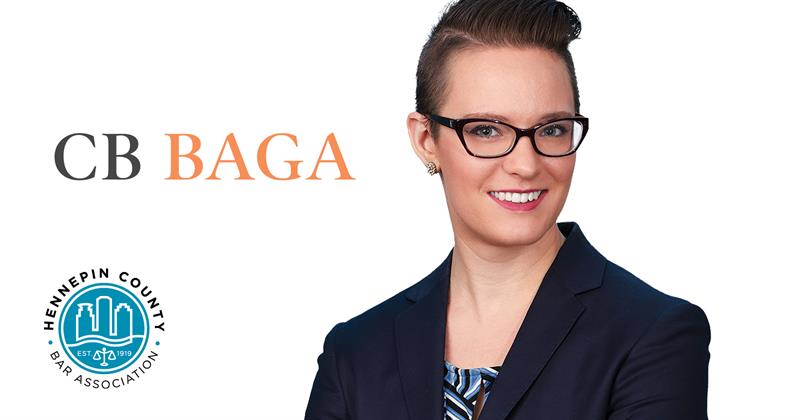
Attorney CB Baga’s favorite color is green, and favorite word is “frond.” And that’s the perfect image for their flourishing, energetic approach to life.
Baga was born to an achievement-oriented and individualistic family that instilled in them the desire for a more equitable world. Learning at a young age that different rules should apply to different people according to their needs, they argue that when it comes to justice, “Traditional concepts of equality don’t work.” Instead, a nuanced approach with tailored responses should be employed.
After an extroverted bookworm’s childhood, Baga discovered an affinity for figure skating, and mock trial. Their love of human movement continues to this day; though their undergraduate diploma reads “Kinesiology: Clinical Movement Science,” Baga jokes that they majored in figure skating. They savored the variety and challenge of the University of Minnesota, Twin Cities’ kinesiology curriculum, which examined biology, ethics, psychology, and civil liberties through the lens of recreation.
Baga always knew they wanted to practice law. They relish the immersive dive into every case, and the intense education about each industry they represent. While describing themselves as “a bit of a performer,” Baga also appreciates the technical challenges of civil litigation. As for what makes a great attorney, “There’s no one clear answer,” they said. In Baga’s view, you become great by playing to your strengths, figuring out what that strength is in your own story.
This drive to progress permeates Baga’s own practice. “I’ve been complacent in the slow pace of change,” they admit, acknowledging the legal industry’s tepid response to some social issues. Their bent for humanitarianism pushed Baga to open a legal clinic for the LGBTQ community before they even graduated from the University of Minnesota School of Law. After receiving approval and encouragement from the pro bono coordinator at Faegre Drinker Biddle & Reath, Baga founded the clinic at a small coffee shop in Minneapolis. “I was stunned,” they recalled. “Stunned that the firm was so supportive.”
With guidance from LGBTQ people, and informed by their own experience as a member of the queer community, Baga quickly grew the clinic into a valuable space to help others. Baga learned as well; for example, realizing that a holistic approach is especially important in pro bono representation. Baga encourages volunteer attorneys to consider their client’s overall situation rather than focusing solely on rigid legal principles. “Lawyers should look at the whole person they’re serving,” Baga said. “They should be their client’s partner.”
Though Baga knew from an early age that they wanted to practice law, they readily acknowledge how our justice system falls short of legal practitioners’ romanticized aspirations. “Our community has been harmed by legal structures. I was in high school when the Lawrence v. Texas decision came down. I was aware it applied to my community,” they recalled. “We as lawyers often think of the law as a source of remedies and accountability to the [LGBTQ] community, but the law is just a source of more problems.”
The legal community should not accept the status quo. “There’s a lot of people who throw up their hands and say, ‘We can’t change these institutional things,’” Baga explained. Historically marginalized communities avoid seeking legal help because, in their experience, legal systems are inherently harmful or problematic. Baga wants to change this perception and reality, and they push themselves to improve the relationship between the law and those it serves.
Baga also noted that beyond the impact on clients, institutional discrimination prevents the legal industry from recruiting and retaining new, valuable talent. As a self-described queer, nonbinary attorney, Baga believes they bring a unique perspective to the table. They explained that much of the law relies on “tropes and frameworks,” and part of being queer is unlearning those frameworks. LGBTQ people might approach legal issues with greater creativity, by reimagining structures and finding creative solutions to problems without following the traditional “script.”
Baga acknowledged that improving the legal profession will take work. Baga suggested that attorneys put their energy into unlearning racism and studying how it has harmed communities of color. According to Baga, all legal practitioners must behave differently to effect change and reduce harm in the world. “We implicitly uphold racism in day-to-day work. We have to find ways to be more discerning.”
With all their work to improve the lives of others, Baga occasionally needs time to recharge. In the midst of the pandemic, Baga has destressed by cooking, listening to their seasonal music playlist, and showcasing their signature literal sense of humor. “I’m secretly super funny,” they revealed about their love for niche puns and technicalities, which came across when asked a rapid-fire question about what object they would take to survive on a deserted island. “Do I have internet access?” they asked. “Because then it’s obviously a computer.”
by Nora Huxtable
nora@arrowheadlegal.com
Nora Huxtable is an associate attorney at Smith Law, in Grand Marais, and an assistant public defender for the State of Minnesota. She is a proud graduate of Northern Michigan University’s journalism program and the University of St. Thomas School of Law. In her free time, she enjoys hiking, theatre, old books, and volunteering with Cook County Search and Rescue.